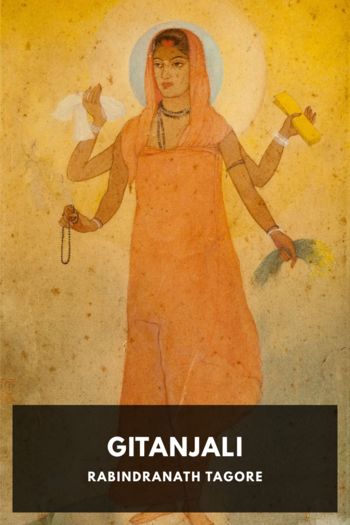My Reminiscences, Rabindranath Tagore [famous ebook reader .TXT] 📗

- Author: Rabindranath Tagore
Book online «My Reminiscences, Rabindranath Tagore [famous ebook reader .TXT] 📗». Author Rabindranath Tagore
The neighbourhood of Maniktola is not wanting in Villa-gardens. We would turn into any one of these at the end, and high- and low-born alike, seated on the bathing platform of a tank, would fling ourselves on the luchis in right good earnest, all that was left of them being the vessels they were brought in.
Braja Babu was one of the most enthusiastic of these blood-thirstless shikaris. He was the Superintendent of the Metropolitan Institution and had also been our private tutor for a time. One day he had the happy idea of accosting the mali (gardener) of a villa-garden into which we had thus trespassed with: “Hallo, has uncle been here lately!” The mali lost no time in saluting him respectfully before he replied: “No, Sir, the master hasn’t been lately.” “All right, get us some green coconuts off the trees.” We had a fine drink after our luchis that day.
A Zamindar in a small way was among our party. He owned a villa on the river side. One day we had a picnic there together, in defiance of caste rules. In the afternoon there was a tremendous storm. We stood on the riverside stairs leading into the water and shouted out songs to its accompaniment. I cannot truthfully assert that all the seven notes of the scale could properly be distinguished in Rajnarain Babu’s singing, nevertheless he sent forth his voice and, as in the old Sanskrit works the text is drowned by the notes, so in Rajnarain Babu’s musical efforts the vigorous play of his limbs and features overwhelmed his feebler vocal performance; his head swung from side to side marking time, while the storm played havoc with his flowing beard. It was late in the night when we turned homewards in a hackney carriage. By that time the storm clouds had dispersed and the stars twinkled forth. The darkness had become intense, the atmosphere silent, the village roads deserted, and the thickets on either side filled with fireflies like a carnival of sparks scattered in some noiseless revelry.
One of the objects of our association was to encourage the manufacture of lucifer matches, and similar small industries. For this purpose each member had to contribute a tenth of his income. Matches had to be made, but matchwood was difficult to get; for though we all know with what fiery energy a bundle of khangras40 can be wielded in capable hands, the thing that burns at its touch is not a lamp wick. After many experiments we succeeded in making a boxful of matches. The patriotic enthusiasm which was thus evidenced did not constitute their only value, for the money that was spent in their making might have served to light the family hearth for the space of a year. Another little defect was that these matches could not be got to burn unless there was a light handy to touch them up with. If they could only have inherited some of the patriotic flame of which they were born they might have been marketable even today.
News came to us that some young student was trying to make a power loom. Off we went to see it. None of us had the knowledge with which to test its practical usefulness, but in our capacity for believing and hoping we were inferior to none. The poor fellow had got into a bit of debt over the cost of his machine which we repaid for him. Then one day we found Braja Babu coming over to our house with a flimsy country towel tied round his head. “Made in our loom!” he shouted as with hands uplifted he executed a war-dance. The outside of Braja Babu’s head had then already begun to ripen into grey!
At last some worldly-wise people came and joined our society, made us taste of the fruit of knowledge, and broke up our little paradise.
When I first knew Rajnarain Babu, I was not old enough to appreciate his many-sidedness. In him were combined many opposites. In spite of his hoary hair and beard he was as young as the youngest of us, his venerable exterior serving only as a white mantle for keeping his youth perpetually fresh. Even his extensive learning had not been able to do him any damage, for it left him absolutely simple. To the end of his life the incessant flow of his hearty laughter suffered no check, neither from the gravity of age, nor ill-health, nor domestic affliction, nor profundity of thought, nor variety of knowledge, all of which had been his in ample measure. He had been a favourite pupil of Richardson and brought up in an atmosphere of English learning, nevertheless he flung aside all obstacles due to his early habit and gave himself up lovingly and devotedly to Bengali literature. Though the meekest of men, he was full of fire which flamed its fiercest in his patriotism, as though to burn to ashes the shortcomings and destitution of his country. The memory of this smile-sweetened fervour-illumined lifelong-youthful saint is one that is worth cherishing by our countrymen.
XXIII The BharatiOn the whole the period of which I am writing was for me one of ecstatic excitement. Many a night have I spent without sleep, not for any particular reason but from a mere desire to do the reverse of the obvious. I would keep up reading in the dim light of our school room all alone; the distant church clock would chime every quarter as if each passing hour was being put up to auction; and the loud Haribols of the bearers of the dead, passing along Chitpore Road on their way to the Nimtollah cremation ground, would now and





Comments (0)